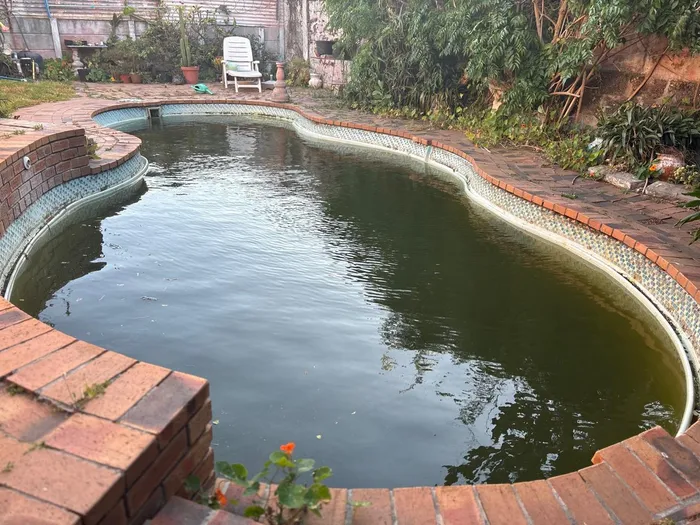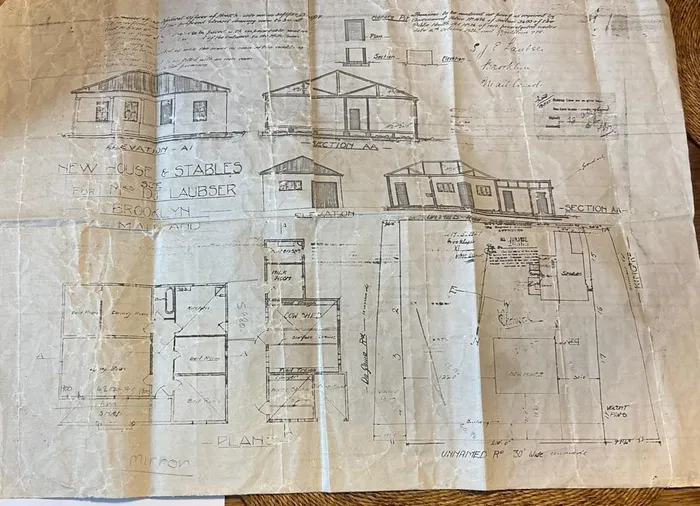Sewage flood sparks demolition threat

The pool at Ms Wessels’s home, left unusable after being flooded with raw sewage.
Image: TARA ISAACS
When 83-year-old Joan Wessels opened her back door on Sunday May 25, she walked into what she describes as “a nightmare no human being should ever go through”.
Raw sewage - knee deep in some parts - had surged across her sloping back garden in Alwin Street, Brooklyn, filling her swimming pool and covering the western side of the yard in human faeces.
“It was knee deep, and to think other people’s poo was floating in my backyard. I became terribly ill, couldn’t eat for days, and had a constant stomach bug,” she said.
Ms Wessels, who moved to South Africa from Holland in the 1970’s, explained that the overflow followed a blockage in the main sewer pump earlier that month.
According to her, the City’s pressure-blasting took place further down the street, but the force of the water caused the manhole lid in her garden to lift, sending raw sewage gushing into her pool.
Even her tortoises struggled to escape the contaminated water, she said. She reported the incident immediately, but help only arrived five hours later.

Ms Wessels’s old plans, now at the centre of the dispute.
Image: TARA ISAACS
A cleaning team disinfected the area and told her to lodge a public liability claim for the damage to her pool, she said.
She was placed in contact with a public liability claims officer, Michelene Morkel, who assured her that an inspector would visit, but months passed without progress, she said.
Then on Friday, October 31, instead of an assessor investigating the sewage damage, a City building inspector, Sinalo Molo, arrived.
To her surprise, he issued a notice for unauthorised building work, alleging that her swimming pool and a masonry structure had been built illegally, and warning that if she did not submit approved building plans within 60 days, demolition action could follow.
“I bought the house as is in 1993. It already had the pool. I have never built anything except changing the floors, which didn’t need plans,” she said.
She even has a set of old plans drawn almost 100 years ago, but the City rejected them because they date from a time when the area was still farmland and the streets had no names.
Ms Wessels said the City told her they would try to locate updated plans, but later informed her that none could be found - shortly before serving her with the notice.
“All these years I have been paying rates and taxes and this is what I get in return… It’s not fair. All I wanted to do was claim for the damages done to the pool. Now they are threatening to demolish my house, and they are making me look like a criminal,” said an emotional Ms Wessels.
The ordeal has deeply affected her granddaughter, who lives with her and depends on the pool for her medical rehabilitation.
Ms Wessels produced doctors’ certificates showing that her granddaughter suffers from complex regional pain syndrome (CRPS), a severe condition that left her wheelchair-bound for more than three years and under the care of Groote Schuur Hospital’s pain clinic.
Aquatherapy formed part of her recovery, and she used the home pool for additional exercises that were helping her regain the use of her limbs.
“But now we cannot use the pool for her because this pool is full of s**t,” said Ms Wessels.
Her granddaughter became emotional while speaking about the impact of the City’s actions.
“Imagine having to move from here just because we are asking them to fix our pool. I barely sleep because I’m thinking of bulldozers coming in and demolishing this home. How do we get from claiming damages for a pool to having a home demolished? It does not make sense,” she said.
The City’s mayoral committee member for finance, Siseko Mbandezi, said the City cannot comment on active claims and advised the claimant to contact the insurance services department for updates.
He said all claims undergo a thorough merits investigation, involving several departments, and that additional information was required from the claimant, which extended the timeframe.
“The City remains committed to finalising the claim and that a building inspection formed part of assessing its merits,” he said.
Mayoral committee member for water and sanitation, Zahid Badroodien, said the City cannot drain or disinfect private pools, as their role is limited to public spaces.
He advised Ms Wessels to proceed with the public liability claim and consult a qualified pool technician.
“The City cannot assume responsibility for any potential or further damage to the pool structure. The City’s role is to regulate development and ensure safety through bylaws, not to undertake private projects, except in specific, legally defined circumstances,” he said.
Mayoral committee member for spatial planning and environment, Eddie Andrews, said development management teams investigate properties to determine whether structures have approved plans.
If none are found, a notice is issued, he said, adding that the duration of a structure’s existence or who built it is irrelevant, and that homeowners are responsible for ensuring all structures comply with the law.
He said no record exists for Ms Wessels’s pool and that aerial photographs show it was built between 1987 and 1997.
"Only structures built before September 1985 are automatically deemed compliant. Where plans cannot be located, owners must submit 'as-built' plans to the City," he said.
Heritage Western Cape CEO, Dr Michael Janse van Rensburg, confirmed the property is not within a Heritage Protection Overlay Zone, but because the structure is older than 60 years, any demolition would require a permit.
After months of delays, paperwork, and unanswered questions, Ms Wessels says she feels overwhelmed and afraid.
“I just want my home to be safe and my pool to be fixed. I never imagined asking for help would put my whole house at risk.”
With the 60-day deadline now looming, she says she is left hoping for one thing: “For someone - anyone - to help me make sense of this.”